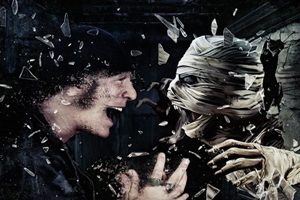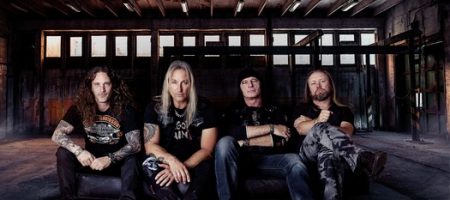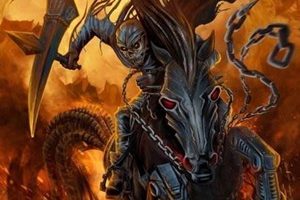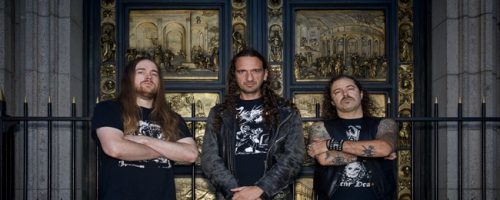Herman Frank – Unique Voice
Thursday, 3rd June 2021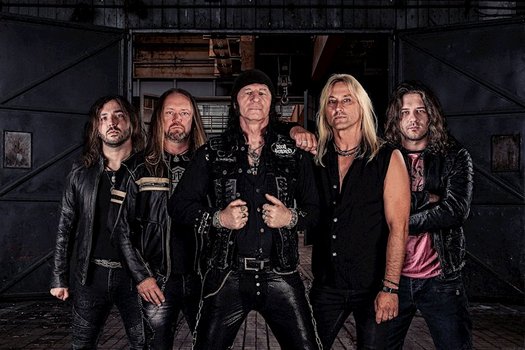
Guitarist Herman Frank continues to crank out his brand of straight-ahead heavy metal with power and energy of men half his age (he’s in his early 60’s). Two for a Lie is the fifth album under the banner, continuing a tradition of anthems and rockers in that mold that Accept/Victory followers treasure. Perfect time to catch up with Herman again via Skype and his humorous, engaging personality made this talk flow very quickly. You’ll learn more about the lineup changes, his thoughts on modern production, catchy riffs/melodies, what younger guitar players/musicians should think about in establishing their own style/voice, as well as the wild world of touring once things return back to normal in 2022.
Dead Rhetoric: Two for a Lie is the fifth Herman Frank solo record. How would you assess the songwriting and performances this time around – and where do you see the differences between this record and the last one Fight the Fear from 2019?
Herman Frank: First of all, the big difference is that I have ten brand new songs! (laughs) That’s the most different thing I can tell. The writing process, more or less if you’ve done a couple of albums is quite the same. There’s no secrets behind this one, and I wish if there would be any secrets to come up, it’s related to effort and lucky moments that you come up with catchy riffs. I just wanted to do a new album. People asked me why did I want to release a new album after one and a half or two years? I said because I can.
Dead Rhetoric: You have two new members in drummer Kevin Kott and second guitarist Michael Pesin. What do you believe each member brings to the table in terms of playing ability, personalities and skill sets that works for the current incarnation of Herman Frank?
Frank: Let’s put it this way. On top there’s written Herman Frank, Rick, myself, and Michael (Müller) are the core of the band. I wish that other people would stay with me forever and ever, it would be much easier. But as you know these days, every musician has to have two or more bands, three or more projects, six schools and all that. It’s going to be a problem to create regarding scheduling, so I had to look for a new drummer. Rick recommended Kevin, and he gives the right guts to the whole thing. Kevin is young, good looking, and a pretty nice guy so it was quite easy to work with him. The same I can tell with Mike Pesin. I found this guy, lives next to my neighborhood in Hanover, so it’s really comfortable. We can meet in the studio or practice together to come up with some new stuff. It’s a really good situation right now, so I don’t mind having two new members in the band right now. Fresh blood is always good.
Dead Rhetoric: It has to be frustrating to always consider new members for the group, because of the music scene changing so much. Do you think these younger musicians understand how much they have to hustle in order to make a living compared to how things were say twenty or thirty years ago?
Frank: I don’t know. Most of the musicians that I know, they have another job besides this. It’s frustrating, thanks to Mr. Spotify, that doesn’t give us a chance to enter into the other side of life. There’s nothing wrong to have a day job these days. As long as you put your biggest effort into the music that you are doing, it might be alright.
Dead Rhetoric: You recently released the new video for “Teutonic Order” – was this an obvious choice to make a visual clip about, and did you try your best to match up the additional sequences beyond band footage to the lyrical content of the song?
Frank: (laughs). I’m a musician you know. I’m not an art director, I guess the guy who did the video he came up with the idea. I thought if he was really sure about it, just do it. I’m a guitar player, I do my best to act in my parts. I’m quite satisfied with the result. These days you can’t do a video in Hollywood, you know? There’s no budget for a movie like in the older days. You have to come up with a small amount of money and do something. The result, I’m really satisfied with.
Dead Rhetoric: When I spoke to vocalist Rick Altzi for the last record cycle, he mentioned your songwriting proficiency. This deep into your career, what makes a strong song to you – and how critical are you of what you develop so that you can still remain fresh?
Frank: I’m the most critical as I can be. I’m always looking in the process of coming up with new stuff, first of all finding a catchy riff, a guitar riff. Maybe you might call it old school but to me a good song in metal or rock has a catchy guitar riff. And then come up with a nice melody for the verse, and for sure the main thing is still the catchy chorus.
Dead Rhetoric: What do you enjoy most about Rick’s voice and range? I also remember him saying now that he’s been in the band for a few records, he feels you push him as far as his range and boundaries…
Frank: As you said, we’ve done a couple of records so far. And it’s getting so much easier these days. This record, I didn’t get the chance to show up in Sweden and work on the material, we used a lot of Zoom, phone, and Skype, you name it. And it wouldn’t have worked out so well if we didn’t know each other so well. This time, it was very easy to come up with the final vocals. We both know each other now, it’s matching really, really good now.
Dead Rhetoric: Tell us about the Kai Swillus design for the cover art this time around – is it a collaborative process that takes place between Kai and yourself to reach the final product, or do you give him free reign based on the music to create this?
Frank: That’s a thing that goes back and forth. I came up with the album title Two for a Lie, and I got this picture in my mind of two people yelling at each other, one is obviously the lie, and the other is a good guy – don’t ask me who is who! (laughs). I tell Kai my ideas for the album title and cover, he comes up with the end product. He is more able to create something better than I could. As a musician I am not as good at painting and computer stuff, in the end I leave it up to him.
Dead Rhetoric: How do you balance what you want to create and need to get out with your music versus what the fans and long-time followers have come to love about your work and expect out of each release?
Frank: Actually, that’s a good question. I hope they enjoy the music. I just want to have them sit down in front of a real stereo, that would be the best situation you can have, to listen to this music in front of a stereo system and not in front of an iPhone. I do the real music, real instruments, real guitars, real drums, and I want people to listen to this album in a real way.
Dead Rhetoric: Do you enjoy the new tools of technology to capture your ideas, but prefer going into a real studio to make these albums?
Frank: I am recording most of my stuff in a real studio. I am not a fan of sitting at home and programming some drums. That’s not the kind of music that I want to do, and I am not used to. I do have a little studio on my own, where I put down my rhythm guitars and lead guitars before I send it out to the boys. This time, we still recorded the drums live, we tested Kevin a hundred times, the same with the bass. I would recommend to every band out there – record in a real studio, it may help you out.
Dead Rhetoric: Do you think bands need to get together more and rehearse their material more before going into the studio – versus the work they do at home?
Frank: (laughs). For sure. It’s the most important thing you can do. There are a lot of people sitting back on their own and just in their living room, coming up with ideas, programming, using tools with artificial guitars, bass, and drums. That’s not the way to do music. Music is still a thing you have to do live, it’s meant to be played with people in a room face to face.
Dead Rhetoric: Could this be why it’s harder for new albums to stand out today? Because of the fact that people are using too much technology and leaving out that human element?
Frank: Just listen to these modern productions. They sound the same and quite similar. Some people think they put three chords together and they play a melody on top of it. That’s not the kind of heavy metal Tony Iommi, Yngwie, Deep Purple or Rainbow did. Or Motorhead. If they would have put a record together in these modern ways, the results would be totally different and they wouldn’t have had the success they had.
Dead Rhetoric: What has heavy metal meant to you personally? Can you think of a specific time where the music helped you through a tough and challenging time in your life?
Frank: It’s a way of life. I think I have lived this for a few decades. It’s helped me go through a valley, if that’s the right word. If you don’t feel that good, or the circumstances aren’t going well, you have to live your tough life. For sure heavy metal helps if you have an aim or a goal. Thinking about a new record helps bring you through.
Dead Rhetoric: How have you handled this downtime with the COVID-19 pandemic beyond working on this record? And what do you think the live concert/festival market will look like once things are safe to get back to consistent shows?
Frank: For me, it wasn’t much different. As I said, I’m in a lucky position that I have my own little studio, I worked most of the time on my own. The only bad thing was I couldn’t practice with the band that much or that often. On the other hand, we are complaining about not playing for a year, on the other hand there are people dying. We should have a little patience and calm down a little bit. It will be over very soon, and everybody may think back and realize there are more important things to worry about than meeting people and going out too early.
As far as the live situation. 2022, there may be a hassle to get slots for touring. I guess clubs will have noon shows, mid-afternoon, evening and midnight shows. I’ll be expecting trouble to get slots for certain shows. We will see.
Dead Rhetoric: How do you view the art of guitar playing today compared to your musical heroes when you were growing up and gaining the skills and proficiency to develop your style? What are some aspects that you wish newer or younger players would take into consideration to become unique or special?
Frank: Don’t pay that much attention to scales or arpeggios! (laughs). I mean, guitar playing, instrument playing is not like going for the Olympics. It’s better to tell something with your instrument. Feelings, and maybe a catchy melody, is more worthwhile than a thousand notes in a second. In the beginning, maybe it’s better to come up with a couple of catchy riffs. Think of “Smoke on the Water” – it sticks on your mind. There’s no need to play a thousand notes a second.
Dead Rhetoric: Is that why you’ve always been attracted to guitar players like John Sykes, Gary Moore, and Ritchie Blackmore, because of their unique voice they each have?
Frank: Unique voice! That’s the phrase I have been looking for. I didn’t know this before. You might look for that. A couple of people have it, and some don’t have it.
Dead Rhetoric: Are there things left to accomplish in your musical career that you haven’t been able to achieve, do, or see as of yet? And will you know when it’s time to step away from the scene?
Frank: Right now, I don’t know when to step away from the scene. There are a lot of things I want to do in the rest of my life. Maybe some different projects with some different musicians I would like to work with. One of the things I want to come up with a best of songs I’ve ever loved, that have changed my life, maybe 12-14 songs and record them with different musicians and different singers.
Dead Rhetoric: What’s on the horizon for Herman Frank over the next year or so to support this record? Are you hopeful that the live touring and festival scene will be coming back to normal for 2022?
Frank: I’m quite sure it will come back to normal in 2022. I think it will happen faster than we can think of. Maybe better.












